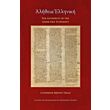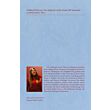Ἀλήθεια Ἑλληνική: The Authority of the Greek Old Testament
Catherine Brown Tkacz
Publication Data: Etna, CA: Center for Traditionalist Orthodox Studies, 2011
Format: softcover
Number of Pages: 55
Dimensions (l × w × h): 21.3 cm × 13.8 cm × 0.5 cm
Additional Information: two-color printing
ISBN: 978‒0‒911165‒93‒7
Catherine Brown Tkacz
Number XLΙΙΙ of Monographic Supplement Series
“[...T]he reason why several changes were initiated by Jewish scholars in their Greek and Hebrew scriptures during the early centuries of Christianity was to distance Jewish scriptures from the new Christian interpretations, even to the extent of changing the words and restricting the canon of scripture. In this way differences in doctrine between Jews and Christians led to differences in the scriptures themselves. Significantly, whereas there were individuals, both Christians and Jews, who altered scriptural texts, the Christian changes were ephemeral and did not affect authoritative translations or editions of the Bible, but Jewish changes became canonized in the M[asoretic ]T[ext]. This line of reasoning affirms what one may call the ἀλήθεια Ἑλληνική, the authority of the Greek Old Testament as real and essential to Christianity. It is the form of Scripture quoted and paraphrased in the New Testament. It is also older than the Hebrew edition known as the Masoretic Text.”
—“Introduction”
CONTENTS
About the Author
Acknowledgments
Ἀλήθεια Ἑλληνική: The Authority of the Greek Old Testament
Introduction
1 Greek and Hebrew, Historically
2 Specific Instances of Jewish Changes in Scripture
3 Genesis 1:1
4 Isaiah 7:14
5 Psalm 21
6 Extensive Changes Within a Biblical Book
7 The Particular Case of Daniel
8 Greek vs. Hebrew Concerning Women
9 Conclusion
Index
Format: softcover
Number of Pages: 55
Dimensions (l × w × h): 21.3 cm × 13.8 cm × 0.5 cm
Additional Information: two-color printing
ISBN: 978‒0‒911165‒93‒7
Catherine Brown Tkacz
Number XLΙΙΙ of Monographic Supplement Series
“[...T]he reason why several changes were initiated by Jewish scholars in their Greek and Hebrew scriptures during the early centuries of Christianity was to distance Jewish scriptures from the new Christian interpretations, even to the extent of changing the words and restricting the canon of scripture. In this way differences in doctrine between Jews and Christians led to differences in the scriptures themselves. Significantly, whereas there were individuals, both Christians and Jews, who altered scriptural texts, the Christian changes were ephemeral and did not affect authoritative translations or editions of the Bible, but Jewish changes became canonized in the M[asoretic ]T[ext]. This line of reasoning affirms what one may call the ἀλήθεια Ἑλληνική, the authority of the Greek Old Testament as real and essential to Christianity. It is the form of Scripture quoted and paraphrased in the New Testament. It is also older than the Hebrew edition known as the Masoretic Text.”
—“Introduction”
CONTENTS
About the Author
Acknowledgments
Ἀλήθεια Ἑλληνική: The Authority of the Greek Old Testament
Introduction
1 Greek and Hebrew, Historically
2 Specific Instances of Jewish Changes in Scripture
3 Genesis 1:1
4 Isaiah 7:14
5 Psalm 21
6 Extensive Changes Within a Biblical Book
7 The Particular Case of Daniel
8 Greek vs. Hebrew Concerning Women
9 Conclusion
Index
Write Your Own Review






